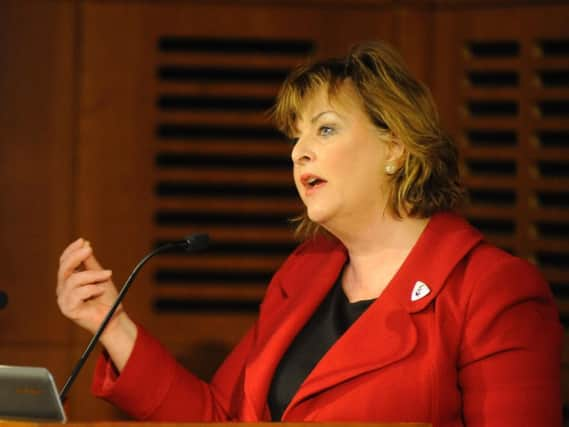Fiona Hyslop: Strong media needed to 'separate fact from opinion' in indyref2


Fiona Hyslop insisted the media had an essential role to play in calling out powerful and influential figures “playing fast and loose with the facts.”
And she said journalism was becoming increasingly important due to the number of people in significant positions of power dismissing facts or questioning analysis.
Advertisement
Hide AdAdvertisement
Hide AdSpeaking at a media conference in Edinburgh, Ms Hyslop pledged the next independence debate would not be a “fact-free zone” and that the government would not be dismissing the views of “experts”.
Addressing the National Union of Journalists event, Ms Hyslop new media platforms like The Ferret and Common Space were operating with “innovative business models and are at the forefront of exploring ways in which journalism can adapt to the opportunities created by the digital economy.”
Ms Hyslop told the conference: “A greater diversity of voices can only be a good thing for our society and our democracy.
“Recent years have been some of the most politically eventful in living memory.
Advertisement
Hide AdAdvertisement
Hide Ad“I feel as if decades worth of politics and change have been packed into just a few short years. We are now preparing for a referendum on Scottish independence.
“Journalists and the media in all its forms are absolutely vital to these democratic processes.
“You help the public to analyse different arguments and the mass of information that is increasingly thrown their way. You help to cut through it, get to the essence of ideas and sort the fact from the opinion.
“It is particularly important at a time when people in significant positions of authority increasingly dismiss facts or question analysis.
Advertisement
Hide AdAdvertisement
Hide Ad“It’s something we saw in the US Presidential election and the EU referendum. I certainly have not had my fill of experts as others seem to.
“We do not want the next independence referendum to be a fact-free zone that the EU referendum debate often became.
We want certainty and we want clarity, and we want that to come from making sure that there is information that is shared and that there is informed opinion being written and read.
“We want the Scottish public to make an informed choice based on a reasoned assessment of all available information.
Advertisement
Hide AdAdvertisement
Hide Ad“Being able to have an evidence-based, rational, respectful debate matters hugely in terms of how our democracy works.
“Disagreement and agreement, dialectic and debate are healthy and are essentially what politics are about.
“The role of the media is essential to our democracy, to help explore arguments and call people in positions of power and influence out when they are playing fast and loose with the facts.
“Scotland was a home to the Enlightenment. It is respected internationally as a place of evidence based, rational discourse. We need to hold onto that very firmly.”
Advertisement
Hide AdAdvertisement
Hide AdScottish Conservative culture spokesman Jackson Carlaw said:“It’s refreshing to see that the SNP have finally realised the importance of a strong media in the political debate.
“However Fiona Hyslop’s words don’t match her party’s actions. Their contempt for anyone not towing the line of independence has been clear to see in the past and I doubt they will change their ways any time soon.”
Scottish Labour’s culture spokesman Lewis Macdonald: “Every test of public opinion confirms that the people of Scotland do not want another referendum on leaving the UK.
"When SNP ministers start lecturing journalists on what constitutes a free press, we are bound to be reminded of the horrendous behaviour of so many campaigners for independence in 2014.
Advertisement
Hide AdAdvertisement
Hide Ad“If Fiona Hyslop is sincere about free and diverse media, and politicians taking the facts into account, she should start by acknowledging that most Scots do not want to go back to the dark days of Nationalist demonstrations at the doors of public service broadcasters, and do not want another independence referendum.”
Meanwhile Ms Hyslop said the Scottish Government was open to ideas about how it could do more to support the media, suggesting it could be treated as part of the creative industries sector in future, but insisted her government had no intention of getting involved in regulation of the Scottish press.
Ms Hyslop said there was some irony that the “significant challenges” faced by many media organisations were being caused by the same trends that had opened up access to news in recent years.
She added: “Social and digital media certainly democratise access to information.
Advertisement
Hide AdAdvertisement
Hide Ad"We know what is going on around the world in real time and we hear about it from a huge range of sources, including individual citizens.
“While current debates about fake news demonstrate that there remain significant questions about the misuse of digital media, having that wealth of information literally at our fingertips must, in principle, be a good thing.”